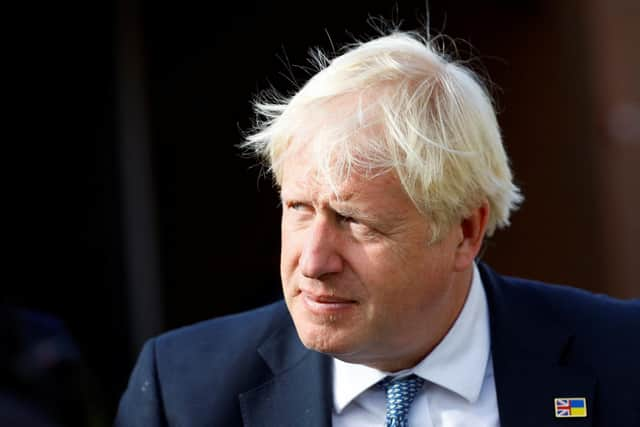Boris was no anomaly but a product of a poor political system - Stewart McDonald
“What had we done for Boris?”, wondered the head of Johnson’s old Oxford college a few months before the 2019 General Election. “Had we taught him truthfulness? No. Had we taught him wisdom? No. What had we taught? Was it only how to make witty and brilliant speeches?”
Those same questions were recently echoed by the head of Eton College, who this week wrote in The Times’ Letters page that the school’s “most important mission will be to ensure that its pupils are saved from the sense of privilege, entitlement and omniscience that can produce alumni such as Boris Johnson, Jacob Rees-Mogg and Kwasi Kwarteng … and thereby damage a country’s social fabric.”
Advertisement
Hide AdAdvertisement
Hide AdThese reflections were welcome – if a few decades too late. But Boris Johnson was not created in those schools alone: he moved and was made in the upper echelons of the British establishment – The Times, The Telegraph, The Conservative Party – before he ever set foot in Westminster. Should it not also merit some deliberation from those institutions – one of them the governing political party – regarding the fact that they have encouraged, empowered, and enabled a man who was so manifestly unsuitable for political office since his earliest days at high school and engineered his elevation to the highest office in the land?


On one level, that would represent an enormous moment for all of us. It would involve admitting the fact that all of Boris Johnson’s most repugnant traits – the serial adultery, the never-ending mendacity, the gratuitous misuse of public money, and all those articles about “tank-topped bumboys” and “piccanninies” with “watermelon smiles” – were the ones that also made him most compelling to watch. For years, people across the UK watched him tear through the public realm for the same reason we slow down on the motorway to peer at the pile-up in the other lane: there is something innate in all of us which draws us towards unrestrained chaos and lurid drama.
But the job of political parties is not to create the car crashes. No serious organisation – much less one ostensibly established to further the public good – should seek to trade in the outrage economy, where a higher premium is placed on braggadocio and anger than on slow deliberation and measured argument. Yet those are exactly the qualities that the UK Parliament was designed to foment, with everything from the voting system used to elect parliamentarians to the very layout of the building engineered to create confrontation, division, and a “winner takes all” mentality.
Look what happened this week when the SNP brought forward a proposal in the Commons to create a Cost-of-Living Committee which would investigate the current crisis and the circumstances that have given this country one of the worst- performing economies in the developed world. The Labour Party refused to support it.
There are many reasons why the Labour Party might have been reluctant to endorse the creation of such a committee. Perhaps it would have been too uncomfortable for them to discuss the Brexit-induced harms their party has enabled. They might even have pointed out that the SNP’s proposal would have made the Chair of this new committee an SNP MP and found a reason to disagree with that.
None of those legitimate arguments came up. Instead, when asked by a journalist earlier this week, a Labour Party spokesperson replied that “normally our position is to abstain on SNP Opposition Day motions … so I’d expect that to be the convention that we would follow today.” That was it. No substance, no policy, no alternative proposal – and no embarrassment about the fact that the Labour Party was opposing the SNP for opposition’s sake.
Returning to the retroactive apologies issued by Boris Johnson’s old teachers, it seems impossible to imagine that level of self-reflection coming from the UK Parliament. Can you imagine Parliament admitting that its culture is not conducive to good governance? Instead, as we saw with Donald Trump, it is much easier and more comfortable to pretend that Johnson was an anomaly rather than a product of a political system which propelled him to the top.
In February last year, we saw Ian Blackford forced to leave the Chamber of the House of Commons because he would not withdraw his true and accurate description of the Prime Minister as a liar. And in recent years – more times than any democrat should be comfortable with – we have watched as an arcane 13th Century rule has been invoked to stop elected parliamentarians from properly discussing allegations swirling around members of the Royal Family.
Advertisement
Hide AdAdvertisement
Hide AdAfter Truss, Johnson and more than a decade of economic mismanagement by the Conservative Party, this situation is untenable. That the UK is being poorly governed from Westminster is not just an SNP campaign slogan: it is an undeniable fact, borne out daily by the nightmarish predictions for this country’s economic future. Our economy is flagging, our society is more polarised than ever and if the UK Parliament is to to meet those challenges, it needs urgent and radical reform.
But there is little to no prospect of that happening.
Until then, we can only sit and watch the car crash. We might question what it would take for a Prime Minister to stand in the Chamber and state that the House of Commons is not doing its job properly – to admit that it too often provides pantomime where it should provide scrutiny. We can ask ourselves what it would take for political parties to put the cost-of-living crisis before petty procedural wins. We can wonder just how bad it has to get in this country before something changes. I worry that it will be too long until we find out the answer.